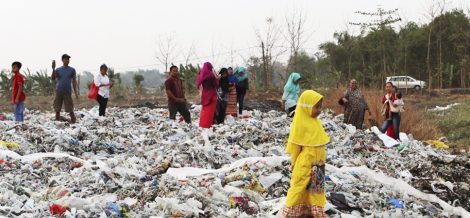“We are calling for an end to all plastic waste trade. We find that some of the developed countries are still trying to dump their waste into other countries. Do not dump your waste into developing nations”, (This is what said on Monday environmental activist Mageswari Sangaralingam of SAM – Friends of the Earth Malaysia in an interview with Real World Radio.
The activist is participating at the 14th Conference of the Parties to the Basel Convention (COP 14) in Geneva, Switzerland, where over 180 countries will discuss from April 28 to May 10 a proposal submitted by Norway to explicitly include plastic waste in the scope of the Basel Convention.
According to Friends of the Earth International, this would help to prevent mismanagement of plastic waste. [1] “One crucial outcome would be that exporters of plastic waste would need prior informed consent from recipient countries”, stated the environmental federation in a press release. [1]
Unsustainable Business
The “Basel Convention on Transboundary Movement of Hazardous Waste and their Disposal” was adopted in 1989 following the discovery in Africa and other parts of the Global South over deposits of toxic wastes imported from abroad.
Meanwhile, the global trade of plastic waste has become a big business. Friends of the Earth International explains that from 1988 to 2016, the top ten plastic waste exporters (including the US, Japan and the UK) exported 168 million tonnes, most of it to China. The environmental federation warns that “the murky reality is that much of the plastic that citizens throw into recycling bins is low-grade, dirty and mixed plastics which are being dumped in countries in the Global South, where they are usually recycled unsafely and to low standards – and often simply incinerated, landfilled or leaked into the environment”. “This is driven by brutal, short-termist economics: exporting is often cheaper than reducing, sorting, cleaning, recycling or reusing it locally”, adds the press release.
In 2017, China notified the World Trade Organization that it intended to ban imports of plastic waste, and the ban came into force in March 2018, setting off a chain reaction in the global plastic waste system. If export rates continue as they are, the new Chinese policy will displace an estimated 111 million metric tons of plastic waste by 2030. Currently this plastic waste is flooding South East Asia: Indonesia, Malaysia, Vietnam, India, Taiwan and Thailand are facing rapid increases in plastic waste imports.
This is why Norway´s proposal to explicitly include plastic waste in the scope of the Basel Convention is so important for Asian countries, as stated by Mageswari in an interview with Real World Radio. She said: “in Malaysia and Indonesia we find that a lot of plastic waste which cannot be recycled has been coming into Malaysia”. This causes “a lot of problems in developing countries, because we do not have the capacity to recycle all the waste that is coming in”.
Mageswari at the COP 14.
A light in our path
The activist mentioned that almost every country supports Norway´s initiative, which is sponsored by Japan and has gathered over 600,000 signatures from the general public. Nevertheless, the US, one of the largest exporters of plastic waste does not support the initiative, although they are not part of the Basel Convention; Argentina is trying to modify the text; and the European Union has made some comments to the text, although with the purpose of improving it, said Mageswari.
The activist stated that plastic waste exporter countries need to get prior informed consent from the importing countries, and that they need to know what they receiving and what are the risks taken. This would be fundamental to effectively regulate plastic waste trade.
The press release issued by Friends of the Earth International warns that recycling in developing countries is unsafe and that it takes place under low standards. The environmental activists warn that only nine percent of plastics ever produced have been recycled. “It is clear we need to tackle the problem at source by reducing production and holding the corporations who profit from this waste trade accountable”.
That´s why Mageswari said that recycling is not the solution to solve the crisis suffered by the developing countries that receive plastic waste. She explained that most Global South countries do not have the capacity to deal with waste, to treat them and clean them up.
About the consequences for the populations of the countries that receive large amounts of plastics, the representative of SAM – Friends of the Earth Malaysia highlighted that this waste ends up on the lands, on the water and on farming lands.
“Frankly a lot of the plastics that are ending up in the ocean, the sea, are coming back to us. We are also eating plastics, because of the micro plastics in the food that we eat from the fish”, stated Mageswari. She also made reference to the recycling industry, where most of the residual waste has to be burned, and this affects the air with toxic emissions, causing breathing problems and skin issues in the nearby communities. “These are the short term illnesses that they are suffering, we are not really sure what is going to happen in the long term”, she warned.
The environmental activist also explained that the burden of cleaning up waste is suffered by the governments of the receiving countries, which can´t afford this clean-up. This is the waste that ends up causing serious environmental consequences for the environment and the health of the population.
Mageswari hopes that Norway´s proposal will be approved on Thursday or Friday under the terms it was submitted, so that plastic waste is included in the scope of the Basel Convention and in order to regulate its management. The activist is clear in expressing the demand of social and environmental organizations present in Geneva: “We are calling for an end to all plastic waste trade. Do not dump your waste into developing nations”, she said to the industrialized world.
